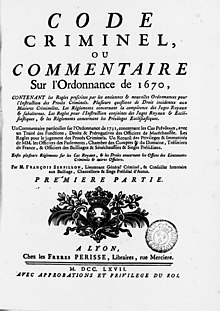|
Criminal Ordinance of 1670 The Criminal Ordinance of 1670 (French: Ordonnance criminelle de 1670, or Ordonnance criminelle de Colbert) was a Great Ordinance dealing with criminal procedure which was enacted in France under the reign of King Louis XIV. Made in Saint-Germain-en-Laye, the Ordinance was registered by the Parlement of Paris on 26 August 1670 and came into effect on 1 January 1671. It was one of the first legal texts attempting to codify criminal law in France. It remained in force until the French Revolution, when it was abrogated by a decree adopted by the National Constituent Assembly on 9 October 1789.[1] The act broadened the jurisdiction of the nationwide policing force Maréchaussée to include burglary and popular disorder and confirmed its power to arrest any offender.[2] It also sought to combat abuse of their authority by putting enforcement under the supervision of local royal courts.[2] HistoryThe Ancien regime ruled without a penal code. On the other hand, they had a code of criminal procedure in the form of the ordonnance criminelle de 1670.[3] ObjectivesMajor goals of the ordinance, were: to let no crime go unpunished; to prevent an innocent person for being convicted of a crime he did not commit; and to enable the judge to apply the criminal law with exactitude, which is to say, to establish a precise proportionality between the offense and the punishment for the offense.[4] See alsoReferences
Works cited
Further reading
External links
|